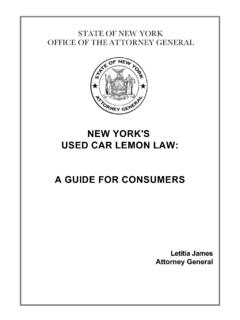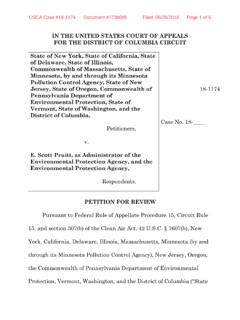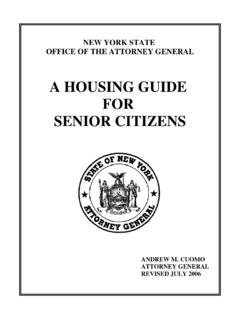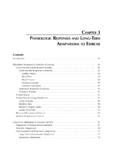Transcription of Changes in New York State Rent Law - Attorney General of ...
1 Changes in New York State Rent LawWhat You Need to Know(800) 771-7755 | TDD/TTY (800) 788-9898 | Dear Friends,If you are a renter in New York State , there are significant Changes in the laws affecting tenants. The Housing Stability and Tenant Protection Act of 2019 provides important protections for renters across the State , like how much a landlord can charge for a security deposit on new leases. For families living in rent-controlled or rent-stabilized apartments, the laws affect how much a landlord can increase your rent. Especially important are the Changes for those with preferential rents, and for those living in a manufactured home park. Every renter in New York should learn about these new protections. This publication will help you understand many of the most significant Changes and how they might affect you.
2 If you have a question about issues not covered in this document or if you think your landlord has broken New York s tenant protection law, contact my office at (800) 771-7755; TDD/TTY Toll Free Line: (800) 788-9898. Sincerely, Letitia JamesOffice of the New York State Attorney General | Letitia JamesCapping Security Deposits Landlords can only charge up to one month of rent for a security deposit or advance payment. This applies to all residential rentals, with a few exceptions, whether you have a lease or not. This means that if you are moving into an apartment where the rent is $1500 a month, the most your landlord can charge for a security deposit is $1500. This also means that your landlord may not charge you in advance for the last month s rent if you are also paying a security Late Payment Fees and Fees for Credit and Background Checks A rent payment can only be considered late if it is received more than five days after it is due.
3 The most your landlord can charge as a late fee is $50 or 5% of your monthly rent, whichever is less. Before signing a lease, the most a landlord can charge is $20 for a credit and background check. The landlord has to give you a copy of the background/credit check, as well as an invoice from the company that performed it. Otherwise, they can t charge you for it. You can provide your own background and credit check to avoid any fees, as long as the background/credit check was done in the past 30 days. New Laws Protecting All Residential Renters(800) 771-7755 | TDD/TTY (800) 788-9898 | No More Tenant Blacklists A landlord cannot deny you an apartment, rental home, or any other type of rental based on a past legal conflict with a landlord . For example, a landlord cannot deny you an apartment because you sued your previous landlord to make repairs.
4 If a landlord rejects your application after using a tenant screening service (a company that landlords use to see if you have ever been taken to court), and you have a past history of tenant- landlord disputes, the law assumes that you were rejected because of this history, and the landlord may have to pay a fine if they cannot give a good reason for denying It Easier to Break a Lease If you leave your apartment or other rental home before your lease ends, your landlord has to make a good-faith effort to fill the vacancy. If the landlord finds a new tenant, and the new tenant s rent is equal or higher to your rent, your lease is considered terminated and you are no longer liable for the Have a Right to a Receipt If you pay rent in cash or money order, your landlord must provide you with a receipt. If you pay rent by check, you may also request a receipt.
5 You only have to ask once. After that, your landlord has to give you a receipt every month. Your landlord must keep proof of cash rent receipts for 3 years. Office of the New York State Attorney General | Letitia JamesNew Protections in Case of Eviction If you lose a housing case and the judge orders your eviction, you can ask the court for up to one year to move if you can show that you cannot find a similar apartment in the same neighborhood. The judge will take into account your health conditions, whether you have children enrolled in school, the hardship on the landlord if you remain, and any other life circumstances that could affect your ability to move. The new law strengthens protections for tenants against retaliatory evictions and increases penalties for landlords who illegally lock tenants out of their homes. Your Rights in Non-Payment Evictions Your landlord cannot bring you to court for non-payment of rent unless they have given you a 14-day written rent demand.
6 Until you are evicted ( the Sheriff or Marshal executes a warrant of eviction), you can have your non-payment case dismissed if you pay all rent that is owed. In a non-payment case, you can only be evicted for not paying your rent. You cannot be evicted for non-payment of other fees (such as late fees, legal fees, or any other added fee).REMINDER: When facing eviction, it is often a good idea to consult an Attorney . There are many free legal service providers across New York State who can represent tenants who qualify for their services. Check The Office of the Attorney General cannot provide direct legal Are Entitled to Notice of Past Due Rent Your landlord must send you a written notice by certified mail every time you are more than five days late with your rent. If your landlord fails to provide you with the notice, you can raise this as a defense in court.
7 (800) 771-7755 | TDD/TTY (800) 788-9898 | Making It Easier to Get Your Security Deposit Back Your landlord must return your security deposit within 14 days of you moving out. If your landlord takes any money out of the security deposit for damages, they must provide an itemized receipt describing the damage and its cost. If your landlord doesn t give you this receipt within 14 days of moving out, then they must return your entire security deposit, whether there is damage or not. If you are planning to move out, you can ask your landlord to inspect the apartment (or rental home or other type of home rental) before you move. They must allow you to be present during the inspection. At that inspection, the landlord must tell you what needs to be fixed or cleaned. You can then take care of the problems yourself to prevent the landlord from keeping part or all of your security deposit.
8 If your landlord deliberately breaks this law, you may be entitled to up to twice the amount of the security deposit. REMINDER: Our office may be able to help you get back your rent security deposit. To request help, simply file a rent security complaint form with:Office of the New York State Attorney General Bureau of Consumer Frauds and Protection New Protections for Residential Renters Who Do Not Live in Rent-Stabilized or Rent-Controlled (800) 771-7755 TDD/TTY (800) 788-9898 28 Liberty Street15th Floor New York, NY 10005 Office of the New York State Attorney General | Letitia JamesBetter Notice of Rent Increases and Lease Non-Renewals If you live in an apartment that is not rent stabilized or controlled, there is still no limit on how much your landlord can increase your rent. However, your landlord must give you advanced written notice before they can raise your rent 5% or more.
9 If your landlord decides not to renew your lease, they must also give you advance written notice. This applies to month-to-month tenants without a lease as well. If you have lived in your apartment two years or more, or if you have a two-year lease, your landlord must provide you with 90 days advance written notice before raising your rent or not renewing your lease. If you have lived in your apartment for more than one year, but less than two years, your landlord must provide you with 60 days advance notice before raising your rent or not renewing your lease. If you have lived in your apartment for less than one year, or have a lease for less than one year, your landlord must provide you with 30 days advance notice before raising your rent or not renewing your lease. If your landlord does not provide you with the required written notice, you have the right to remain in the apartment at your current rent until you are given the written notice and the time period that applies to you of 90, 60, or 30 days, expires.
10 (800) 771-7755 | TDD/TTY (800) 788-9898 | Rules for Major Capital Improvements (MCI) Increases The MCI formula has changed to limit the amount that landlords may collect after performing a major capital improvement. The amount your landlord can raise your rent due to an MCI increase is now capped at 2% of your current rent per year, and there is no retroactive amount. This 2% cap also applies to MCI increases that happened between June 16, 2012 and June 16, 2019 so any rent increase going forward will be limited to 2%. MCI increases cannot be added to your rent if there are any hazardous or immediately hazardous violations at your building. Your landlord must fix these violations before any MCI can be authorized by State regulators. If fewer than 35% of the apartments in your building are rent regulated, the landlord cannot get an MCI increase .












